Lemon balm may improve sleep quality and help people fall asleep faster through its calming compounds like rosmarinic acid. Scientific studies show promising results for sleep benefits, though more research on lemon balm alone is needed since many studies combine it with other herbs. People can use lemon balm as tea, supplements, or extracts, but should consult healthcare providers before use, especially if taking medications.
Many people struggle with falling asleep or staying asleep through the night. They often look for natural ways to improve their sleep without using prescription medications. Lemon balm, a herb from the mint family, has become popular as a natural sleep aid.

Research suggests that lemon balm may help improve sleep quality and reduce the time it takes to fall asleep, especially when combined with other calming herbs like valerian. Lemon balm contains rosmarinic acid[1], a compound that appears to have calming effects on the nervous system. Studies show that people who used lemon balm experienced better sleep quality compared to those who took a placebo.
The herb works by promoting relaxation and reducing anxiety, which are common barriers to good sleep. Lemon balm is a calming, anti-inflammatory herb[2] that people can consume as tea, take as supplements, or use in other forms. Understanding how this natural remedy works and its proper use can help people make informed decisions about adding it to their bedtime routine.
Key Takeaways
How Lemon Balm Supports Better Sleep
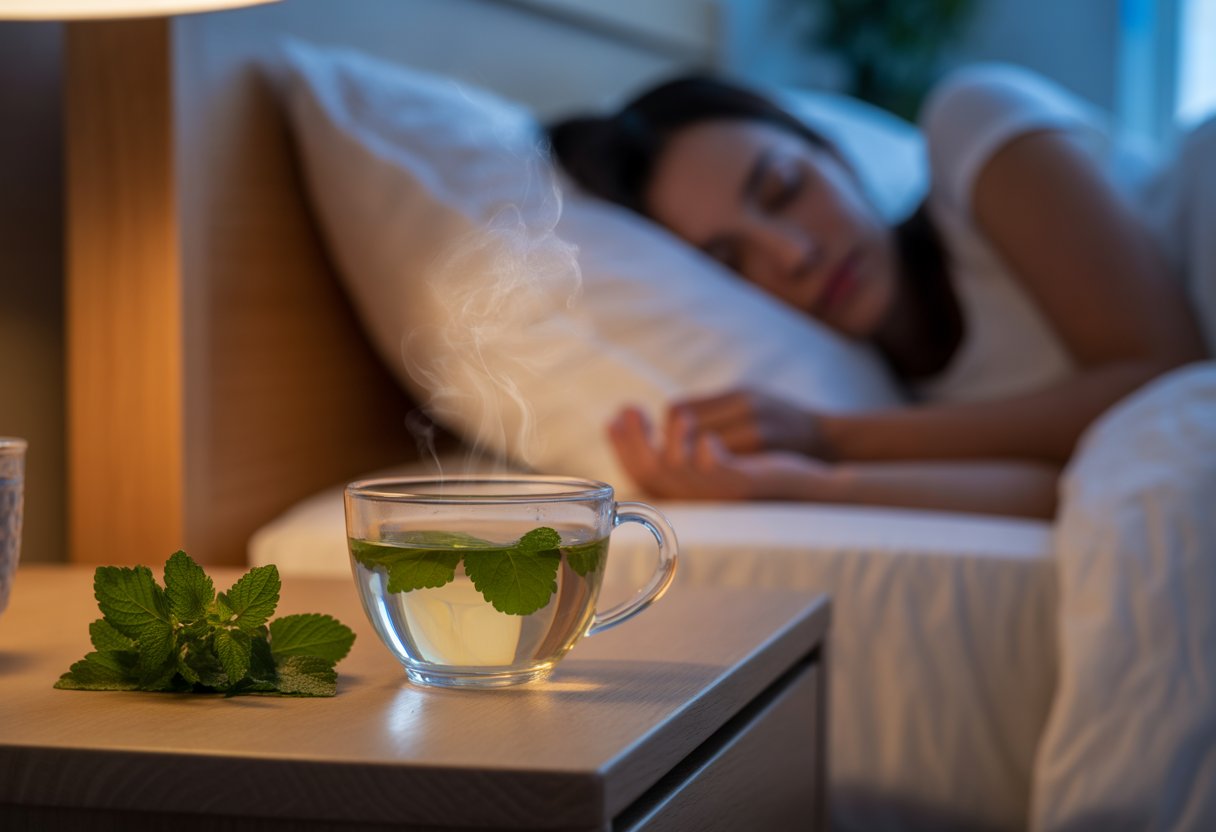
Lemon balm works through multiple pathways to promote restful sleep by calming the nervous system and reducing stress hormones. Research shows this natural sleep aid can significantly improve sleep quality while addressing underlying anxiety that often disrupts sleep patterns.
Mechanisms Behind Lemon Balm’s Calming Effects
Lemon balm contains compounds that interact with GABA (gamma-aminobutyric acid) receptors in the brain. GABA is the body’s primary calming neurotransmitter that helps slow down nerve activity.
The herb’s active compounds include rosmarinic acid and flavonoids. These substances help enhance GABA function, creating sedative effects similar to prescription sleep medications but with gentler action.
Unlike synthetic sleep aids, melissa officinalis works gradually with the body’s natural systems. The plant doesn’t force sleep but instead creates conditions that make falling asleep easier.
Key Active Compounds:
- Rosmarinic acid
- Citronellal
- Geraniol
- Linalool
These compounds work together to produce the herb’s anxiolytic properties. They help quiet racing thoughts and physical tension that prevent restful sleep.
The calming agent also affects acetylcholine receptors. This interaction helps regulate the sleep-wake cycle naturally without causing morning drowsiness.
The Role of Lemon Balm in Reducing Stress and Anxiety
Stress and anxiety are major causes of sleep problems. Lemon balm addresses these root issues by lowering cortisol levels and promoting relaxation.
The relaxing herb helps reduce physical symptoms of stress. These include muscle tension, rapid heartbeat, and shallow breathing that interfere with sleep onset.
Clinical studies show lemon balm can reduce anxiety, depression, and stress scores[3] when used regularly. Participants experienced noticeable improvements within 15 days of supplementation.
Stress Reduction Benefits:
- Lowers cortisol production
- Reduces muscle tension
- Slows heart rate
- Deepens breathing patterns
The herb works as a natural anxiolytic without dependency risks. People can use it long-term for anxiety relief without building tolerance.
Many users find combining lemon balm with other calming herbs enhances its effects. Popular combinations include valerian root and chamomile for comprehensive sleep support.
Impact on Sleep Disorders and Insomnia
Research demonstrates lemon balm’s effectiveness for various sleep disorders. One study found 85% of participants achieved full remission of insomnia[3] after 15 days of treatment.
The natural sleep aid helps people fall asleep faster and stay asleep longer. All study participants experienced improved sleep quality regardless of their specific sleep issues.
Lemon balm works particularly well for sleep problems caused by anxiety or stress. The herb addresses both the mental and physical aspects of sleep disruption.
Sleep Improvement Areas:
- Faster sleep onset
- Reduced night wakings
- Deeper sleep stages
- Better morning alertness
People with mild to moderate sleep disorders see the best results. The herb provides gentle support without the harsh side effects of prescription medications.
Recommended dosages range from 80-150 mg of lemon balm extract daily. Many people prefer taking it 30-60 minutes before bedtime for optimal effects on sleep quality.
Scientific Evidence and Traditional Uses
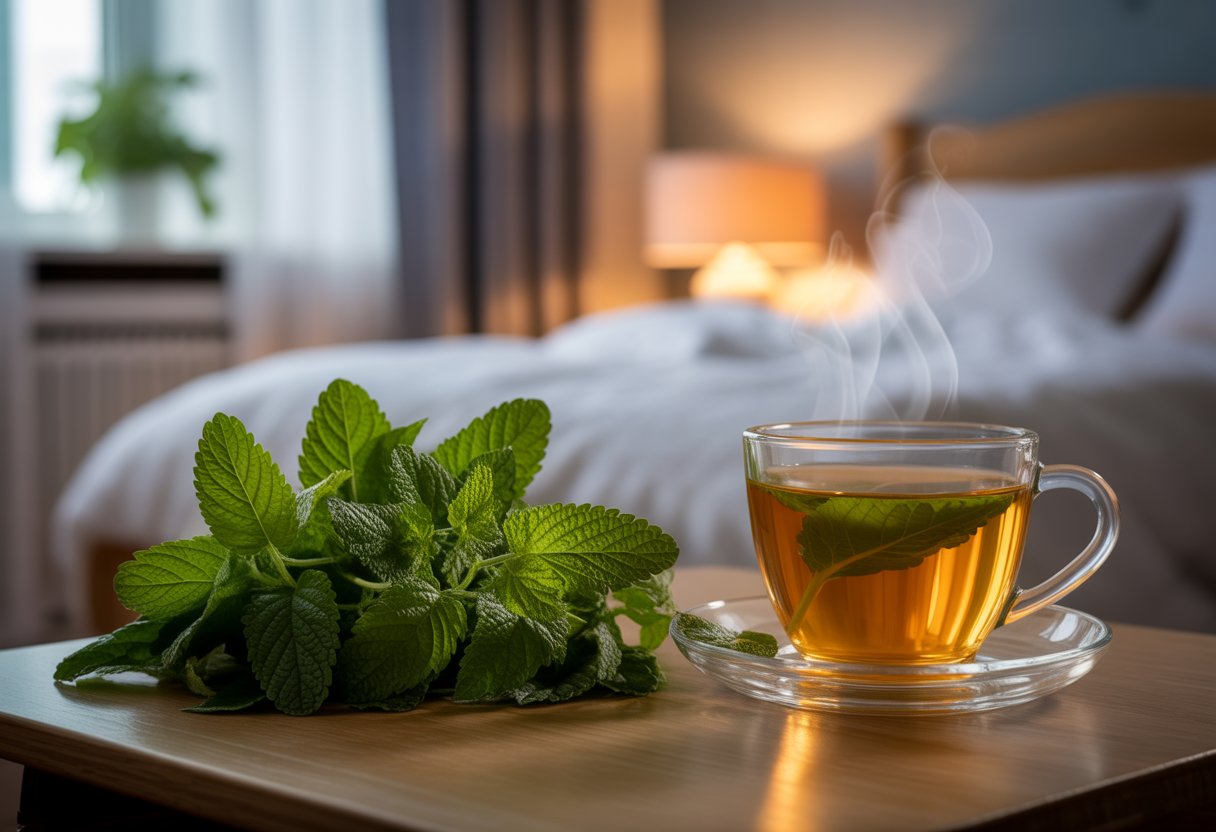
Research shows lemon balm can improve sleep quality through its calming compounds, while traditional medicine has used this herb for centuries as a natural sleep remedy. Modern studies confirm many of these traditional applications, especially when combined with other calming herbs.
Key Research Findings on Sleep Improvement
A recent Italian study provided strong evidence for lemon balm’s sleep benefits. Researchers tested a special form called Melissa officinalis Phytosome on 30 participants[4] in a double-blind, placebo-controlled trial.
The results were impressive. 87% of participants reported better sleep during lemon balm treatment compared to only 30% with placebo.
The study measured actual sleep patterns using devices. Participants taking lemon balm supplements showed significant increases in deep sleep, also called slow-wave sleep. This sleep phase helps with memory and brain recovery.
Lemon balm extract contains rosmarinic acid and other compounds that work with brain chemicals. These substances interact with GABA receptors, which help calm the nervous system. They also affect acetylcholine-esterase, supporting relaxation.
Clinical trials show lemon balm works best for sleep problems related to anxiety and stress. The herb’s calming and anti-inflammatory properties[2] make it effective for people whose sleep troubles come from worry or tension.
Traditional and Modern Applications as a Sleep Aid
Traditional medicine has used sweet balm for over 2,000 years as a sleep aid. Ancient Greek and Roman healers prescribed it for restlessness and nervous conditions.
People commonly drink lemon balm tea before bed as part of their nighttime routine. The warm liquid and herb’s natural oils create a calming effect. Many herbalists recommend steeping 1-2 teaspoons of dried lemon balm in hot water for 10-15 minutes.
Modern applications include standardized extracts and capsules. These natural remedies offer more consistent dosing than traditional teas. Some people prefer them as alternatives to over-the-counter sleep aids that may cause morning drowsiness.
Research supports using lemon balm for anxiety-related sleep problems[5] rather than general insomnia. This matches traditional uses, where herbalists recommended it specifically for worry-induced sleeplessness.
Adding lemon balm to a bedtime routine helps signal the body to prepare for rest. The ritual of preparing tea or taking supplements creates a mental transition from day to night.
Lemon Balm in Combination with Other Calming Herbs
Valerian root and lemon balm work well together for sleep support. Valerian acts as a stronger sedative while lemon balm provides gentle calming effects. This combination reduces the potential grogginess that valerian alone might cause.
Chamomile pairs naturally with lemon balm in bedtime teas. Both herbs have mild, pleasant flavors and complementary actions on the nervous system. Chamomile adds anti-inflammatory benefits to lemon balm’s anxiety-reducing effects.
Popular herbal sleep blends often include:
- Lemon balm for anxiety relief
- Valerian for deeper sedation
- Chamomile for gentle relaxation
- Passionflower for nervous tension
These combinations allow lower doses of each herb while maintaining effectiveness. The herbs work through different pathways, creating a broader range of calming effects than single ingredients.
Some commercial sleep formulas use standardized extracts of all these herbs. This approach provides consistent amounts of active compounds compared to loose herbal teas.
Other Health Benefits and Key Compounds
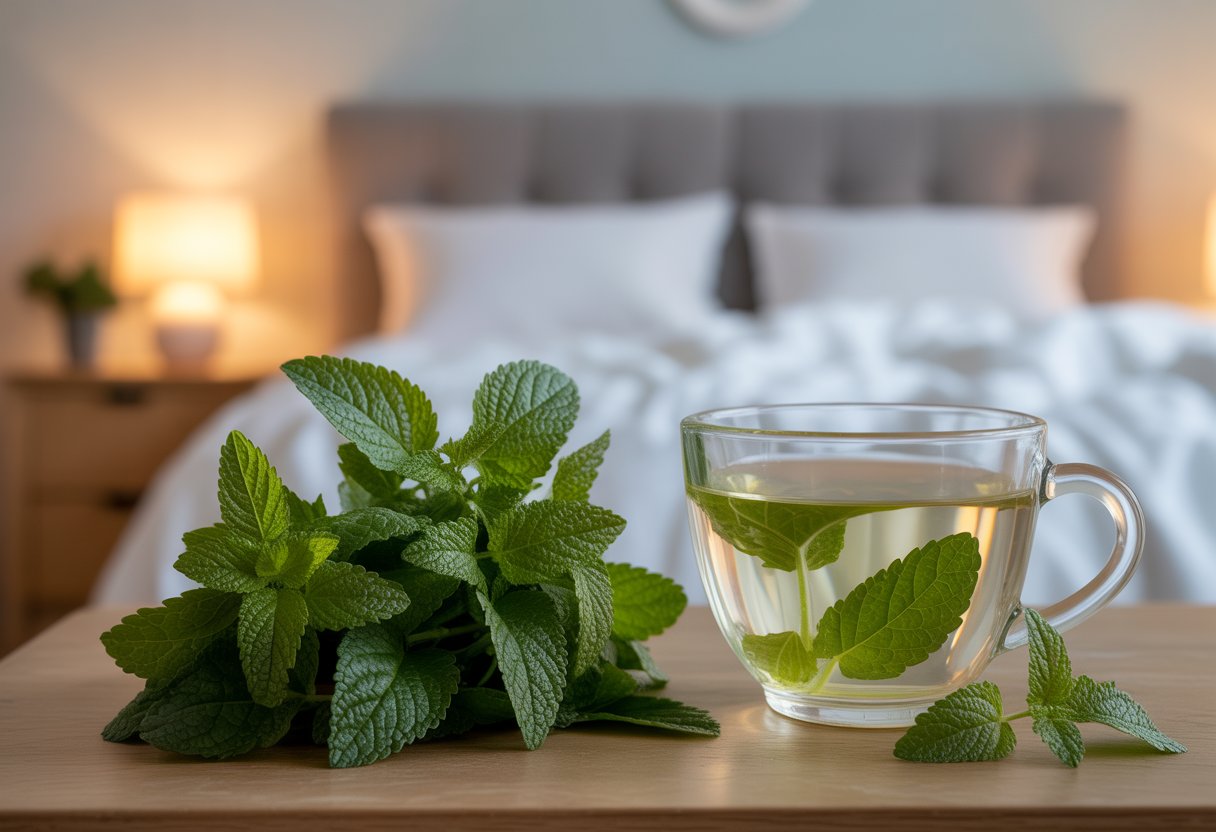
Lemon balm contains powerful compounds like rosmarinic acid, flavonoids, and terpenes that extend benefits beyond sleep improvement. These active components support mental clarity, heart health, digestive comfort, and natural antiviral protection.
Active Components Supporting Sleep and Overall Health
Lemon balm’s therapeutic effects come from several key compounds that work together. Rosmarinic acid serves as the primary active component, crossing the blood-brain barrier to influence neurotransmitters directly.
The herb contains multiple flavonoids that act as potent antioxidants. These compounds protect cells from damage while supporting the calming effects that improve sleep quality.
Terpenes like citral contribute to lemon balm’s distinctive scent and therapeutic properties. Citral specifically helps reduce inflammation and supports the herb’s sedative effects.
Essential oils within lemon balm include geranial, neral, and citronellal. These compounds enhance the herb’s ability to modulate GABA activity[6], creating the relaxation response that promotes better sleep.
The antioxidant properties of these compounds also protect brain cells from oxidative stress. This protection may benefit people at risk for neurodegenerative conditions while supporting overall brain function.
Mental Health, Cognitive Function, and Heart Health
Lemon balm significantly impacts mental health through its effects on neurotransmitters. The herb helps with anxiety and depression[2] by increasing GABA levels in the brain.
Cognitive function improves when people use lemon balm regularly. The herb inhibits acetylcholine esterase, which helps maintain memory and mental clarity.
Research shows lemon balm may improve cognitive function[7] in healthy adults. Users often report better focus and reduced mental fatigue.
Cardiovascular health benefits from lemon balm’s antioxidant compounds. The herb helps reduce oxidative stress that can damage blood vessels and heart tissue.
Some studies suggest lemon balm may help regulate blood sugar levels. This effect could benefit people managing type 2 diabetes, though more research is needed.
Heart health improves through reduced stress and anxiety levels. Lower stress directly benefits cardiovascular function and blood pressure regulation.
Digestive Health and Antiviral Properties
Lemon balm acts as a natural carminative and antispasmodic for digestive issues. The herb helps reduce bloating, indigestion, and stomach cramps effectively.
People with irritable bowel syndrome (IBS) may find relief using lemon balm. The herb’s antispasmodic properties calm intestinal muscles and reduce digestive discomfort.
Digestive health improves through lemon balm’s ability to stimulate increased appetite in some users. However, the herb doesn’t directly cause weight loss.
Antiviral properties make lemon balm effective against certain viruses. The herb shows particular promise against herpes simplex virus, with topical applications reducing outbreak severity.
Research demonstrates that lemon balm compounds can inhibit viral replication. This makes it useful for both internal immune support and external antiviral applications.
The herb’s antiviral effects work best when applied early during viral infections. Regular use may help strengthen the body’s natural defenses against common viruses.
How to Use Lemon Balm for Sleep and Considerations
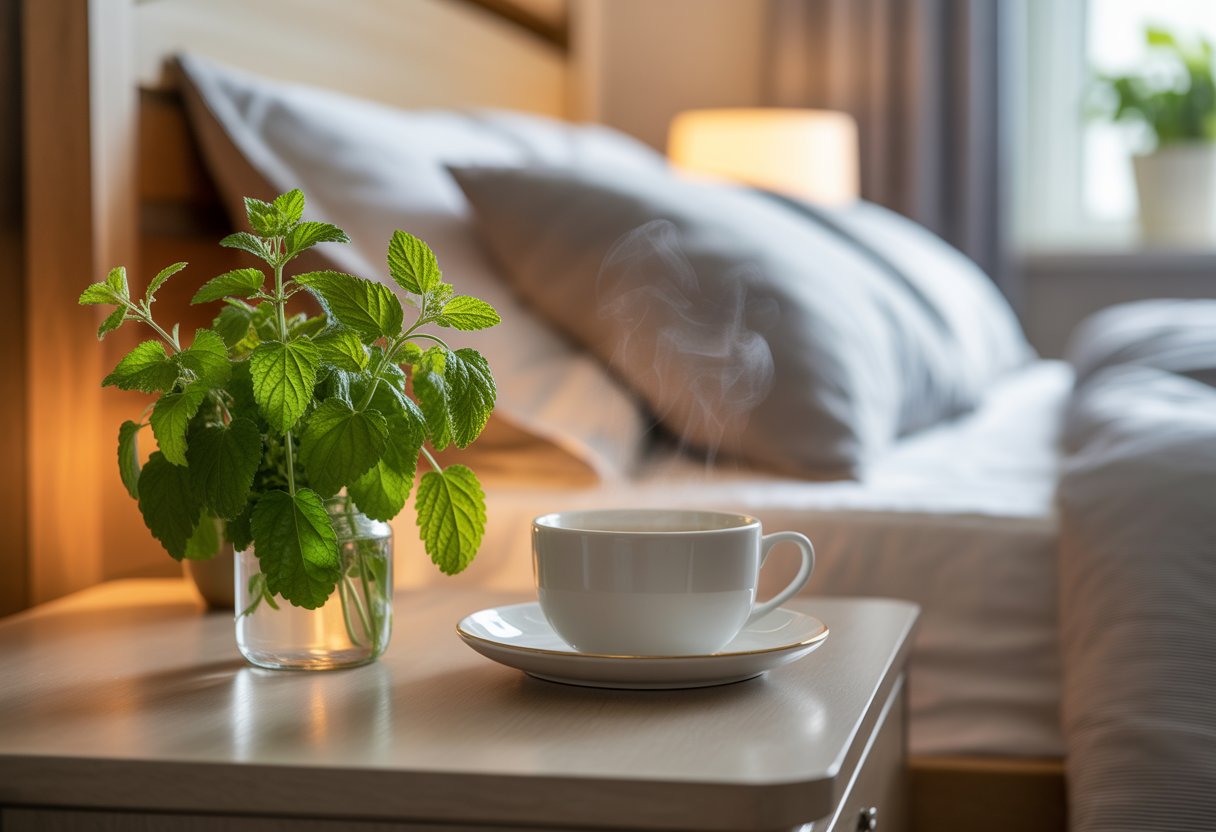
Lemon balm is available in multiple forms including teas, tinctures, and capsules, with varying preparation methods for sleep support. Safety considerations include potential interactions with thyroid medications and sedatives, plus common side effects like headache and dizziness.
Forms and Preparation Methods
Lemon balm comes in several forms suitable for sleep support. Lemon balm tea remains the most popular option, made by steeping 1-2 teaspoons of dried leaves in hot water for 5-10 minutes before bedtime.
Lemon balm extract and lemon balm tincture offer more concentrated doses. Tinctures typically require 1-3 droppers full mixed in water or taken directly under the tongue.
Supplements in capsule or tablet form provide standardized doses. These are widely available at health stores and online retailers.
Fresh lemon balm leaves can be used to make homemade tea. This Mediterranean perennial herb from the mint family (Lamiaceae family) grows easily in gardens and attracts bees with its fragrant leaves.
Lemon balm supplements are available[1] in capsule, tablet, powder, and tincture forms. Each preparation method offers different absorption rates and convenience levels for users.
Dosage, Safety, and Potential Side Effects
Research shows lemon balm extract doses of 0.3 grams[1] reduced stress in healthy adults. However, no standard dosage exists for sleep support.
Common side effects include:
- Headache
- Dizziness
- Nausea
- Skin irritation when applied topically
Some users may experience palpitations or increased anxiety at higher doses. Skin rash can develop in sensitive individuals using topical preparations.
People with thyroid conditions should avoid lemon balm without medical supervision. High doses may affect thyroid hormone production and potentially impact blood pressure regulation.
The risk of side effects increases[1] with higher doses. Long-term use is not recommended due to limited safety research.
Children, pregnant women, and nursing mothers should avoid lemon balm supplements. The Botanical Safety Handbook recommends caution for these populations.
Interactions with Medications and Precautions
Thyroid medication users should exercise extreme caution with lemon balm. The herb may interfere with medications like levothyroxine by affecting thyroid function.
Sedatives pose significant interaction risks. Combining lemon balm with other sedative substances[1] can intensify drowsiness and create dangerous effects.
Problematic combinations include:
- Prescription sleep medications
- Anti-anxiety drugs
- Alcohol
- Other calming herbs like valerian
HIV medication may interact with lemon balm, though research remains unclear. Patients taking antiretroviral drugs should consult healthcare providers before use.
People with hypertension should monitor their blood pressure when using lemon balm, as it may affect cardiovascular function.
Healthcare providers recommend avoiding lemon balm[1] if taking glaucoma medications or planning surgery. Users should stop the herb several days before scheduled procedures.
Frequently Asked Questions
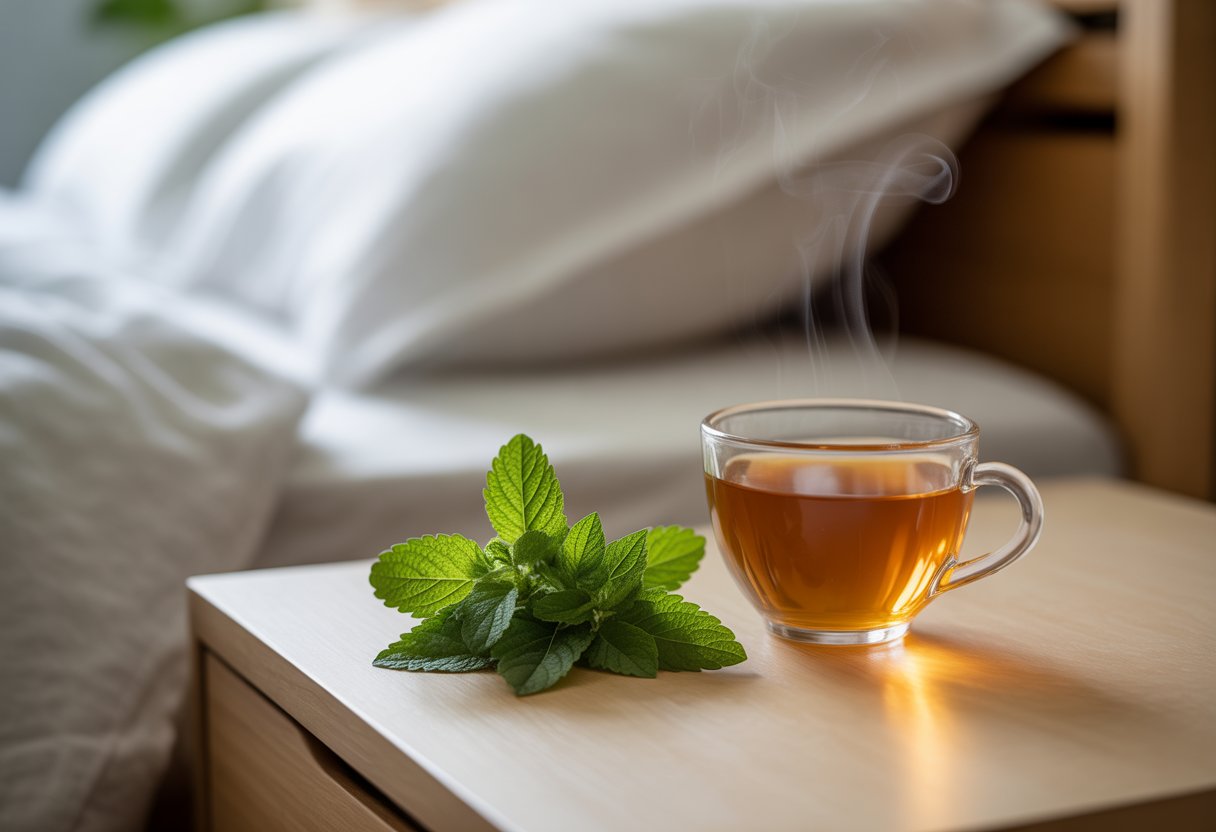
Lemon balm shows promise for sleep improvement through its calming compounds, though research remains limited. Understanding its benefits, side effects, and interactions helps people make informed decisions about using this herb for better rest.
What are the advantages of using lemon balm for sleep improvement?
Lemon balm contains rosmarinic acid, which may improve sleep quality[1] in people with insomnia. This compound appears to have calming effects on the nervous system.
Studies show that lemon balm combined with valerian root significantly improved sleep quality in 100 menopausal women. The participants experienced better rest compared to those taking a placebo.
The herb’s natural sedative properties help relax the mind and body before bedtime. Many people find it gentler than synthetic sleep aids with fewer morning grogginess effects.
Lemon balm also helps reduce anxiety, which often interferes with sleep. By calming racing thoughts, it may make falling asleep easier and more natural.
Are there any potential side effects from using lemon balm as a sedative?
Common side effects[1] include headache, nausea, bloating, gas, and stomach pain. Some people may experience dizziness or feelings of agitation.
Higher doses increase the risk of side effects. Long-term use is not recommended without medical supervision.
People with thyroid problems should avoid lemon balm without doctor approval. High doses can slow thyroid hormone production, affecting metabolism and other body functions.
Stopping lemon balm suddenly after long-term use may cause rebound anxiety. Gradual reduction helps prevent withdrawal symptoms.
Some individuals develop contact dermatitis when applying lemon balm preparations to skin. Testing a small area first helps identify potential allergic reactions.
How does lemon balm compare to chamomile in promoting restful sleep?
Both lemon balm and chamomile belong to calming herbs that promote relaxation. Chamomile contains apigenin, which binds to brain receptors that reduce anxiety and initiate sleep.
Lemon balm works through rosmarinic acid and other compounds that affect the nervous system differently. Research suggests both herbs have mild sedative effects without causing dependency.
Chamomile has more extensive research supporting its sleep benefits. Clinical studies show consistent results for improving sleep quality and reducing time to fall asleep.
Lemon balm research focuses more on anxiety reduction, with sleep benefits often studied in combination with other herbs. Individual responses vary between the two plants.
Many people find chamomile more widely available and easier to prepare as tea. Lemon balm offers a citrusy flavor that some prefer over chamomile’s more bitter taste.
Can lemon balm tea be consumed before bedtime to aid in sleep?
Lemon balm tea can be consumed before bedtime as a natural sleep aid. The warm liquid helps signal the body to prepare for rest while delivering the herb’s calming compounds.
Fresh or dried lemon balm leaves work well for tea preparation. Steeping for 5-10 minutes allows adequate extraction of beneficial compounds without becoming too bitter.
Most people find drinking lemon balm tea 30-60 minutes before bedtime optimal. This timing allows the herb’s effects to begin while establishing a relaxing bedtime routine.
The tea form provides gentler effects than concentrated supplements or extracts. This makes it suitable for people who want mild sleep support without strong sedation.
Children, pregnant women, and nursing mothers should avoid lemon balm tea until more safety research exists. Adults should start with small amounts to assess individual tolerance.
What are the known interactions of lemon balm with other sleep medications?
Lemon balm can intensify the effects of other sedative medications and substances. Combining it with sleep medications[1] like Ambien, Ativan, or Sonata may cause excessive drowsiness.
The herb also interacts with over-the-counter sleep aids and alcohol. These combinations can lead to dangerous levels of sedation and impaired coordination.
Other calming herbs like valerian, chamomile, and St. John’s wort may create additive effects when used with lemon balm. This increases the risk of oversedation and morning grogginess.
Lemon balm potentially interacts with thyroid medications like levothyroxine and glaucoma drugs like travoprost. These interactions may reduce medication effectiveness or cause unwanted effects.
People taking antiretroviral medications should use caution with lemon balm. Though research is unclear, potential interactions may affect treatment outcomes.
Is there scientific evidence to support the use of lemon balm for anxiety and sleep disorders?
Current scientific evidence for lemon balm’s sleep benefits remains limited but promising. Most studies combine lemon balm with other herbs, making it difficult to determine its individual effects.
A small pilot study found that 0.3 grams of lemon balm extract reduced stress and improved mood in healthy adults. Participants reported feeling calmer within one to three hours of consumption.
Research on sleep specifically shows positive results when lemon balm combines with valerian root[1]. However, studies examining lemon balm alone for sleep disorders are lacking.
Laboratory studies demonstrate that lemon balm contains compounds with sedative and anti-anxiety properties. Animal studies support these findings but human trials remain insufficient.
More randomized controlled trials are needed to establish definitive evidence for lemon balm’s effectiveness. Current research suggests potential benefits but requires further investigation for conclusive recommendations.
References
- Lemon balm contains rosmarinic acid. https://www.verywellhealth.com/the-health-benefits-of-lemon-balm-89388 Accessed November 7, 2025
- 6 Benefits of Lemon Balm. https://health.clevelandclinic.org/lemon-balm-benefits Accessed November 7, 2025
- Lemon Balm May Support Restful Sleep. https://www.naturalhealth365.com/sleepless-nights-find-out-how-lemon-balm-could-be-your-secret-to-better-sleep.html Accessed November 7, 2025
- Lemon balm may reduce insomnia. https://www.nutraingredients.com/Article/2024/12/10/lemon-balm-may-reduce-insomnia/ Accessed November 7, 2025
- How does lemon balm benefit anxiety, depression and sleep?. https://examine.com/faq/how-does-lemon-balm-benefit-anxiety-depression-and-sleep/ Accessed November 7, 2025
- Lemon Balm Benefits for Sleep and Stress Relief. https://healthbenefitsofeating.com/lemon-balm-sleep-stress-relief/ Accessed November 7, 2025
- Lemon Balm Extract Benefits and Side Effects. https://mdsleep.mdbiowellness.com/sleep-doctors/lemon-balm-extract-benefits-and-side-effects/ Accessed November 7, 2025
